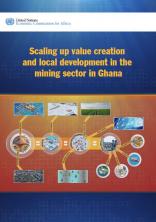Scaling Up Value Creation and Local Development in the Mining Sector in Ghana

Africa is the most mineral-rich continent by square kilometre and, for more than one century, has been engaging in industrial-scale mining for export to supply the world’s most advanced industrial sectors. The continent, however, is entangled in a paradox: notwithstanding its rich
endowments and highly coveted resources, the mining sector has failed to drive economic development and wealth creation in many countries. Resource-rich countries have been unable to attract sufficient investment in other diversified activities along their value chains, commensurate with their share of global resources. Sadly, countries remain over-dependent on the export of raw materials and continue to import most of the inputs that the mining sector needs to operate. Mineral value chains are the weakest link of African mineral-rich economies,
and Ghana is no exception.
In Ghana, as elsewhere in Africa, mineral resources, in particular gold, have shaped the economic landscape for more than 100 years. The country is the second-largest African gold producer and ranks tenth in the world, and produces other minerals such as bauxite, manganese, iron ore and diamond. It also has proven reserves of many other minerals, including lithium. Commercial oil production commenced in 2010.
The economic contribution of the mining sector in Ghana cannot be overstated. Mining has no doubt brought in significant fiscal payments: total fiscal receipts attributed to the mining sector alone accounted for 22 per cent of government revenue in 2016. The sector is also the largest source of investment inflows from the world’s biggest gold-producing countries and the leading export earner, with a total share of 45.5 per cent in 2016, far ahead of the second and third main exporting sectors, namely, cocoa, which accounted for 22.3 per cent, and crude oil, at 12.5 per cent of total export earnings.